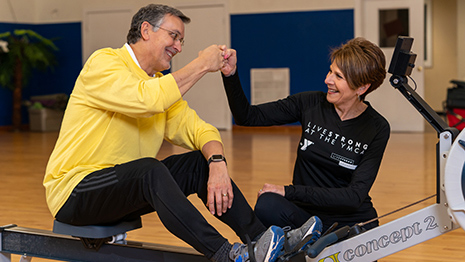LiveSTRONG Program

Both UM Shore Regional Health and the YMCA are focused on keeping people healthy in the community. Retired gastroenterologist Dr. Michael Fisher works with Barbara Jarrell, a YMCA LiveSTRONG instructor, during his cancer recovery.
A partnership among LiveSTRONG, the Cancer Center at UM Shore Regional Health and YMCA of the Chesapeake is helping patients undergoing cancer treatment and cancer survivors get back to living their lives.
When people battle cancer, finding a sense of normalcy during and after treatment can be difficult. Regaining their strength can help, but they don't always know where or how to start.
To help, the Cancer Center at University of Maryland Shore Regional Health (UM SRH) and YMCA of the Chesapeake are working together to offer LiveSTRONG, a no-cost, 12-week fitness program
LiveSTRONG Program
The program is led by YMCA instructors who are trained in working with people who are undergoing cancer treatment as well as cancer survivors. Each group has 6 to 12 members and may include people still in cancer treatment, as well as cancer survivors.
Participants meet twice a week for 90-minute sessions that include up to 20 minutes of cardio, followed by work on strength training, balance and flexibility.
Location and Scheduling
The program is offered on a rotating basis according to demand and instructor availability at YMCA of the Chesapeake locations in Caroline, Dorchester, Kent, Queen Anne’s and Talbot counties.
- For more information about these locations, visit ymcachesapeake.org.
Contact Us
For questions about LiveSTRONG enrollment, please contact the Cancer Center's nurse navigator at 410-820-6800
